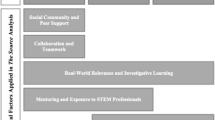Abstract
Through simulated experiences, RPGs aid children’s exploration of issues, but their design can be labor-intensive. In our recent Academy Camp, children rapidly created, played, and reflected on their own RPGs using a large language model (GPT-4) for topics in which they were interested. This fast-paced, cyclical process has a double impact on children’s comprehension of social issues: first through game design, then through game play. We anticipate further applications for this method.
Access this chapter
Tax calculation will be finalised at checkout
Purchases are for personal use only
Similar content being viewed by others
Notes
- 1.
All prompts (and their excerpts) appearing in this paper were originally written in Japanese and translated into English by GPT-4 (and then fine-tuned), in the hope that it would be consistent with the GPT-4’s interpretation of the prompts.
- 2.
The VR part, prepared as a breather where everyone plays in VRChat and Minecraft [12], is not directly related to the content of this paper, hence the description is omitted.
- 3.
Throughout this paper, the singular they is used to obscure gender.
- 4.
As was the case in game #1, the GPT-4 GM appears to have a guardian mechanism in place to get the story back on track without hurting people.
- 5.
Since our access to GPT-4 was limited, we played one game at a time through a shared screen throughout the camp.
- 6.
We suspected at this time that there was an ethical mechanism embedded in GPT-4 that did not want a situation where it would deplete the oceans.
- 7.
Once again, the ethical mechanisms of GPT-4 must have kicked in, as nothing terrible happened to the town despite the players’ attempts to steer it in the bad direction.
- 8.
The first author played game #1 in English, and the dice rolls per query was 0.5.
References
Aubusson, P., Fogwill, S., Barr, R., Perkovic, L.: What Happens When Students Do Simulation-role-play in Science? Res. Sci. Educ. 27(4), 565–579 (1997)
Block by Block Foundation: Block by Block (as of 2023). https://www.blockbyblock.org/
Boysen, M.S.W., Lund, O., Jørnø, R.L., Skovbjerg, H.M.: The role of expertise in playful learning activities: a design-based self-study within teacher education aimed at the development of tabletop role-playing games. Teach. Teach. Educ. 128, 104–128 (2023). https://doi.org/10.1016/j.tate.2023.104128
DAIR.AI: Prompt Engineering Guide (2023). https://www.promptingguide.ai/
Daniau, S.: The transformative potential of role-playing games-: from play skills to human skills. Simul. Gaming 47(4), 423–444 (2016)
Frasca, G.: September 12th: a toy world (2003). http://serious.gameclassification.com/EN/games/734-September-the-12th/index.html
Frasca, G.: Simulation versus Narrative: Introduction to Ludology. In: The Video Game Theory Reader, Chapter 10, pp. 221–235. Routledge, London (2013)
Fukatsu, T.: How to play a fantasy RPG on ChatGPT? (2023). (in Japanese). https://note.com/fladdict/n/nb66db952f992
Georgiadi, N., et al.: A pervasive role-playing game for introducing elementary school students to archaeology. In: Proceedings of the 18th International Conference on Human-Computer Interaction with Mobile Devices and Services Adjunct, pp. 1016–1020. MobileHCI ’16, Association for Computing Machinery (2016). https://doi.org/10.1145/2957265.2963117
Harel, I., Papert, S.: Constructionism. Ablex Publishing Corporation, New York (1991)
Krain, M., Shadle, C.J.: Starving for knowledge: an active learning approach to teaching about world hunger. Int. Stud. Perspect. 7(1), 51–66 (2006). https://doi.org/10.1111/j.1528-3577.2006.00230.x
Mojang Synergies AB: Minecraft (as of 2023). https://www.minecraft.net/
Obari, D.: How to Use ChatGPT as a Detailed and Interactive Text-Based RPG (2023). https://www.makeuseof.com/how-to-use-chatgpt-as-an-interactive-rpg/
OpenAI: Introducing ChatGPT (2022). https://openai.com/blog/chatgpt
OpenAI: GPT-4 Technical Report (2023). https://doi.org/10.48550/ar**v.2303.08774
Radford, A., Wu, J., Child, R., Luan, D., Amodei, D., Sutskever, I.: Language Models are Unsupervised Multitask Learners (2019). https://paperswithcode.com/paper/language-models-are-unsupervised-multitask
Saito, K., et al.: Academy camp VR: serious game constructions as active learning experiences for children. In: Söbke, H., Spangenberger, P., Müller, P., Göbel, S. (eds.) Serious Games. JCSG 2022. LNCS, vol. 13476, pp. 39–45. Springer, Cham (2022). https://doi.org/10.1007/978-3-031-15325-9_4
Simonneaux, L.: Role-play or debate to promote students’ argumentation and justification on an issue in animal transgenesis. Int. J. Sci. Educ. 23(9), 903–927 (2001). https://doi.org/10.1080/09500690010016076
VRChat Inc.: VRChat (as of 2023). https://hello.vrchat.com/
Acknowledgements
The event Academy Camp VR &RPG 2023.5 was funded by a GlobalGiving grant made in partnership with Riot Games. We thank ethnographers in training: Aki Tanikoshi, Gaku Noguchi, Kotoka Kawanaka, Tomoyasu Hirano, and their supervisor, emeritus professor Naohito Okude of Keio University, for detailed recording of the activity. We also thank Naozumi Takenaka for giving children extensive advice on their game design.
Author information
Authors and Affiliations
Corresponding author
Editor information
Editors and Affiliations
Rights and permissions
Copyright information
© 2023 The Author(s), under exclusive license to Springer Nature Switzerland AG
About this paper
Cite this paper
Saito, K. et al. (2023). Double Impact: Children’s Serious RPG Generation/Play with a Large Language Model for Their Deeper Engagement in Social Issues. In: Haahr, M., Rojas-Salazar, A., Göbel, S. (eds) Serious Games. JCSG 2023. Lecture Notes in Computer Science, vol 14309. Springer, Cham. https://doi.org/10.1007/978-3-031-44751-8_21
Download citation
DOI: https://doi.org/10.1007/978-3-031-44751-8_21
Published:
Publisher Name: Springer, Cham
Print ISBN: 978-3-031-44750-1
Online ISBN: 978-3-031-44751-8
eBook Packages: Computer ScienceComputer Science (R0)




